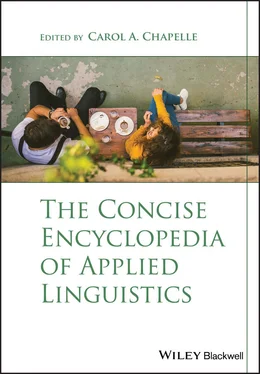Carol A. Chapelle - The Concise Encyclopedia of Applied Linguistics
Здесь есть возможность читать онлайн «Carol A. Chapelle - The Concise Encyclopedia of Applied Linguistics» — ознакомительный отрывок электронной книги совершенно бесплатно, а после прочтения отрывка купить полную версию. В некоторых случаях можно слушать аудио, скачать через торрент в формате fb2 и присутствует краткое содержание. Жанр: unrecognised, на английском языке. Описание произведения, (предисловие) а так же отзывы посетителей доступны на портале библиотеки ЛибКат.
- Название:The Concise Encyclopedia of Applied Linguistics
- Автор:
- Жанр:
- Год:неизвестен
- ISBN:нет данных
- Рейтинг книги:5 / 5. Голосов: 1
-
Избранное:Добавить в избранное
- Отзывы:
-
Ваша оценка:
The Concise Encyclopedia of Applied Linguistics: краткое содержание, описание и аннотация
Предлагаем к чтению аннотацию, описание, краткое содержание или предисловие (зависит от того, что написал сам автор книги «The Concise Encyclopedia of Applied Linguistics»). Если вы не нашли необходимую информацию о книге — напишите в комментариях, мы постараемся отыскать её.
Applied linguistics is an interdisciplinary field that identifies, examines, and seeks solutions to real-life language-related issues. Such issues often occur in situations of language contact and technological innovation, where language problems can range from explaining misunderstandings in face-to-face oral conversation to designing automated speech recognition systems for business.
includes entries on the fundamentals of the discipline, introducing readers to the concepts, research, and methods used by applied linguists working in the field. This succinct, reader-friendly volume offers a collection of entries on a range of language problems and the analytic approaches used to address them.
This abridged reference work has been compiled from the most-accessed entries from
(www.encyclopediaofappliedlinguistics.com)
the more extensive volume which is available in print and digital format in 1000 libraries spanning 50 countries worldwide. Alphabetically-organized and updated entries help readers gain an understanding of the essentials of the field with entries on topics such as multilingualism, language policy and planning, language assessment and testing, translation and interpreting, and many others.
Accessible for readers who are new to applied linguistics,
:
Includes entries written by experts in a broad range of areas within applied linguistics Explains the theory and research approaches used in the field for analysis of language, language use, and contexts of language use Demonstrates the connections among theory, research, and practice in the study of language issues Provides a perfect starting point for pursuing essential topics in applied linguistics Designed to offer readers an introduction to the range of topics and approaches within the field
is ideal for new students of applied linguistics and for researchers in the field.












